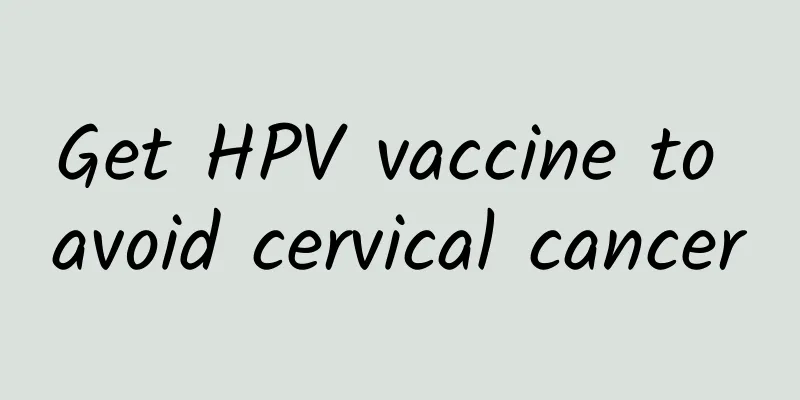Get HPV vaccine to avoid cervical cancer

|
Analysis of clinical manifestations of cervical cancer Patients with early cervical cancer do not have obvious symptoms. As the disease progresses, vaginal bleeding will occur. In the early stage, it manifests as a small amount of bleeding after sexual intercourse, which is also called contact bleeding. In addition, there will be increased menstrual flow, shortened menstrual cycle, and prolonged menstrual period. Menopausal patients will have irregular vaginal bleeding. Some patients will have vaginal discharge of white or bloody liquid, as well as thin, rice-like liquid, accompanied by a fishy odor. In patients with advanced cervical cancer, cancerous tissue necrosis leads to infection and the appearance of a large amount of purulent, rice-like foul-smelling leucorrhea. In addition to the above symptoms, there will also be pain, frequent and urgent urination, constipation, uremia, anemia and other problems. Cervical cancer screening Women under 21 years old do not need to be screened. Women aged 21-29 should be screened every three years. Women aged 30-64 should be screened every 3-5 years. Women over 65 years old can stop screening if previous test results are normal. Cervical cancer screening for women mainly involves cervical cytology examination, and regular screening begins three years after the start of sexual life. If the human papillomavirus is positive and the cervical TCT test is abnormal during the test, a colposcopy and cervical biopsy are required for confirmation. If it is an HPV16/18 infection, vaginal examinations should be performed regularly, and biopsies should be performed if necessary. Women who have had high-grade cervical lesions in the past need to continue regular screening as their age increases after the lesions subside. How to get the cervical cancer vaccine Currently, there are three types of vaccines that can prevent cervical cancer: bivalent, quadrivalent, and nine-valent HPV vaccines. The bivalent vaccine is mainly for cervical cancer caused by HPV16/18 infection. The quadrivalent vaccine can prevent cervical cancer caused by HPV16/18, as well as vulvar and genital warts caused by HPV6/11. The nine-valent vaccine can also prevent 20% of cervical cancer caused by five other high-risk viruses, such as 31, 33, 45, 52, and 58. The bivalent vaccine is only suitable for women aged 9-45 years old to prevent cervical cancer. The bivalent vaccine adopts a three-dose immunization program, with one dose each in 0, 1, and 6 months, for a total of three doses. The quadrivalent vaccine is suitable for patients aged 20-45 years, and the vaccination program is 1, 2, and 6 months. The nine-valent vaccine is mainly suitable for women aged 16-26 years old. Things to note after vaccination Within three months before the HPV vaccine, you need to avoid the use of immunoglobulin and blood products. After the HPV vaccine is injected, you need to stay on site for observation for 30 minutes, and you can leave only if you do not have any discomfort. Because after the vaccination, you may experience pain, fever, swelling at the injection site, or fever, fatigue, muscle pain, headache, joint pain, and gastrointestinal discomfort. These symptoms do not require special treatment and can be relieved on their own. In addition, some patients may experience upper respiratory tract infections, dizziness and other abnormal conditions. If these occur, you need to seek medical attention in time. HPV vaccination ≠ cervical cancer screening HPV vaccine is an important measure to prevent cervical cancer. Although most infections can be eliminated on their own, HPV infection in some women can cause changes in the cervix and subsequently develop into cervical cancer. The use of HPV vaccine can reduce the incidence of cervical cancer, but whether HPV vaccine is needed depends on factors such as age and infection status. In addition, HPV vaccine cannot prevent all HPV infections. HPV vaccination can reduce the infection rate of HPV and significantly reduce the incidence of cervical cancer. To prevent cervical cancer, you must first prepare for the vaccine, and secondly, do regular cancer screening. Early detection and diagnosis of cervical cancer and appropriate treatment can achieve a cure. How to prevent HPV HPV infection is very normal, and there is a high probability that it will be eliminated by itself after infection, so there is no need to be overly nervous. We must learn to adjust our emotions, make our emotions happy, maintain good living habits, eat a reasonable diet, supplement vitamins appropriately, exercise more to improve immunity, and eliminate the virus as soon as possible. Change and wash underwear in time. It is best to soak it in boiling water and expose it to the sun, which can achieve a good sterilization effect. Clean before each sexual intercourse. Women should avoid vaginal irrigation, which can cause vaginal flora disorders, and bacterial flora disorders can lead to vaginitis. Men should keep their foreskin clean to avoid invasion of bacteria, mycoplasma, chlamydia, etc. It is recommended to use condoms during sex. Condoms can significantly reduce the occurrence of genital warts, high-grade cervical epithelial neoplasia, and cervical invasive tumors. Conclusion: Getting the HPV vaccine is a good preventive measure, but it cannot completely protect against cervical cancer. Therefore, after getting the HPV vaccine, you should avoid unhealthy sexual activities. At the same time, you should strengthen your own immunity and do regular cervical cancer screening to reduce the chance of developing cervical cancer. Author: Jiang Ailan, Guangxi Guiping City Center for Disease Control and Prevention |
<<: World Kidney Day | Be careful with your kidneys during enhanced CT scans
Recommend
How to choose shrimp for shrimp paste? The production process of shrimp paste
Most of us know that shrimps are very nutritious....
Why is the woman's face dark yellow?
Women's skin should be white, rosy, tender an...
Why do people use "steel wool" to rub burn wounds? The latest situation of the "burned mother" who moved the whole network →
Recently, Zhuji, Zhejiang Huang's mother was ...
What is a pregnancy cervical check?
Generally speaking, women who find out they are p...
What are the disadvantages of eating too many glutinous rice balls? The nutritional value of glutinous rice balls
The nutritional value of glutinous rice balls lie...
Can I have an MRI if I have braces?
Author: Shen Jinjuan, Department of Neurology, Af...
After the abortion, water flows down
What is the reason for water discharge from the v...
I have a heavy menstrual period but I am pregnant
If you are found to be pregnant during your menst...
Once stretch marks appear, they grow rapidly
In fact, giving birth is a very difficult process...
Mature egg size
Many people do not understand when the follicles ...
Vitamin K can not only stop bleeding and assist in calcium supplementation, but also inhibit vascular calcification
Vitamin K was first discovered by humans in 1934....
What month is the spring tea season? When is the spring tea harvested?
The temperature during the Spring Festival is mod...
What are the benefits of drinking red dates and astragalus tea during menstruation
Recently, red dates and astragalus tea has become...
What should I do if I haven’t given birth at 39 weeks of pregnancy?
Many female friends always feel anxious in the la...









